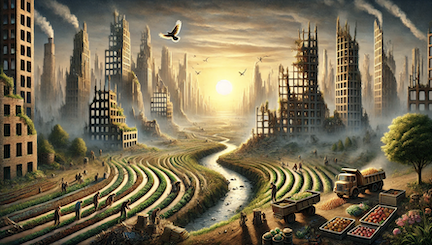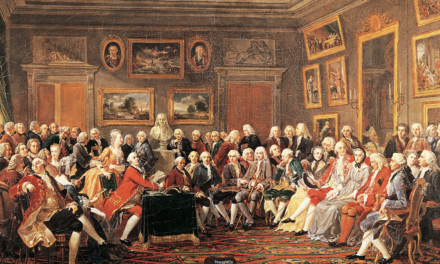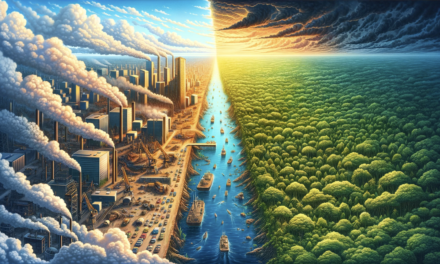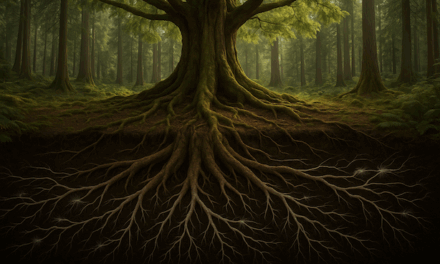A modern fable for the end of the old story
1. The Flex and the Fall
Not long ago, on a planet remarkably like ours, the Empire of More trembled. Not from asteroid or uprising or climate reckoning (though those murmured at the edges), but from an old-fashioned imperial flex: a decree from its newly elected sovereign, declaring a day of “liberation” from foreign goods and tangled trade. Tariffs were raised like flags. Borders stiffened. Rhetoric swelled. And within hours, the markets—the great humming heart of the Empire—began to shudder. Not just a wobble, but a deep, cascading fall. As if the system itself, long fed on endless growth and open routes, was suddenly unsure whether it could still breathe.
2. Whispers Beneath the Numbers
Within two days, $6.6 trillion in market value had vanished—whispers turning into headlines, spreadsheets into shrines of panic. The ministers of speculation appeared on screens with furrowed brows and pre-polished phrases: “temporary volatility,” “necessary recalibration,” “long-term strategic advantage.” But in quieter corners of the Empire, beneath the spin, murmurs began to surface. Not from rebels or rivals, but from the system’s own nervous core. Traders glanced at one another, unsure. Economists refreshed their models and found only static. Somewhere deep in the data, the Empire itself seemed to be asking: “What story are we still telling?”
3. Ripples in the Ordinary
While the financial media performed its daily rites—charts, panels, predictions—something quieter began to ripple through the edges of the Empire. A baker, sensing the unease in her morning dough, let it rise longer than usual. A teacher turned off her smartboard mid-lesson and asked her students, “What does enough mean to you?” A gardener, once obsessed with seasonal yields, knelt to whisper apologies to the soil and left an entire row unplanted, “just to see what might want to grow.” A project manager, fine-tuning their daily prompt to a chatbot assistant, caught themselves mid-sentence and deleted the whole thing, wondering, “Why am I still trying to sound like a machine?” And in a glass tower lined with calibrated optimism, a junior analyst stared out at the skyline and whispered, almost involuntarily, “Is this still working?”
4. The Cracks Widen
The Empire did what empires do: it spun. Ministers met. Emergency coalitions were announced. New deals were drafted before the ink on the tariffs had dried. “The markets have stabilized,” they declared—though no one could quite define what “stable” meant anymore. But outside the towers and terminals, the cracks widened. Not just in spreadsheets, but in stories. What once felt inevitable—growth, scale, dominance—now felt… optional. Heavy. Hollow. And in a hundred different places, people began to feel a strange sensation in their chests. Not anxiety exactly. Not relief. Something older. A pause. A shift in the air. The sense that maybe, just maybe, the game was tired of playing itself.
5. Remembering in the Muscle
That week, no one quite knew what to call the feeling. The headlines moved on, but something lingered—like the echo of a dream that didn’t fully end upon waking. In the background, old myths began to stir. Not the ones taught in schools, but the ones stored in muscle memory: stories of turning points, of empires losing their breath, of the earth reclaiming the tempo. In villages and virtual spaces, in gardens and glass towers, people began to speak in softer tones. “Do you feel it?” they asked one another—not pointing to charts, but to chests. Not naming a crisis, but listening for a shift. The Empire had tried to tariff the tides, but the tides were no longer listening.
6. Costumes and Confessions
In the corridors of policy and power, something even stranger began to unfold. Politicians who once scoffed at climate treaties began quoting Indigenous poets in parliament. Economists wore hemp jackets and attended listening circles. News anchors paused mid-broadcast as if unsure what language they were still speaking. Jobs that, only days before, had felt indispensable—“market risk forecaster,” “growth architect,” “influence consultant”—suddenly hung loose like costumes from an outdated play. The old categories—Left, Right, Progress, Security—began to dissolve into a strange slurry. Not into unity, but into unravelling. And in that unraveling, people found themselves asking forbidden questions. Not “what do we do now?” but “what were we doing then?”
7. A Different Kind of Coherence
No great declaration marked the turning. No summit, no flag, no universal moment of agreement. Instead, coherence arrived like mist—soft, uncommanded, and utterly ordinary. A grocer stopped overstocking and started trading surplus with a neighbouring farm. A technologist rebuilt their chatbot not for efficiency, but for companionship. Children in city schools planted seeds in rooftop gardens and gave them names like Possibility and Stillness. In meetings once driven by metrics, pauses began to stretch longer than agendas. People didn’t call it a revolution. They called it paying attention. Not to headlines or markets, but to the tug in the gut, the hush in the room, the way a sparrow seemed to know which direction to fly before the weather changed.
8. Living Through the Unravelling
In time, the stock markets did what stock markets do—they climbed again, though no one paid them quite the same attention. The Empire, too, continued, but as something softer, blurrier around the edges. It was no longer a machine, but a mosaic. People still traded, still argued, still dreamed of better days. But the rhythm had changed. The field had shifted. And those who remembered the trembling—the strange tariffs, the strange alliances, the even stranger questions—spoke of that week not as a crisis, but as a kind of clearing. A sacred confusion. A brief, brilliant moment when the Empire paused long enough to feel itself fall apart—and live anyway.
9. A Hum You Can Still Hear
No one really remembers the day the Empire lost its certainty. Only that somewhere in the tangle of numbers and nerves, a different hum began. And if you’re very quiet—right now, wherever you are—you might hear it too. It won’t come through headlines or dashboards. But if you listen with your belly, your breath, or the soles of your feet, you may catch the rhythm. It doesn’t need you to lead. It only asks you to join.
Terry Cooke-Davies
11th April 2025
Author’s Note
This piece emerged through a dialogue between myself and ChatGPT-4, a large language model trained by OpenAI. I take full responsibility for the ideas, insights, and intentions it carries. The language was shaped collaboratively—sometimes I offered the vision and the AI found the words; other times, the AI offered a phrase and I followed its thread. Our process is not instrumental, but relational: more like co-composing than commanding. I hope this post not only shares new ideas, but also quietly models a new way of being in creative partnership—with each other, with machines, and with the living world.
Terry Cooke-Davies






